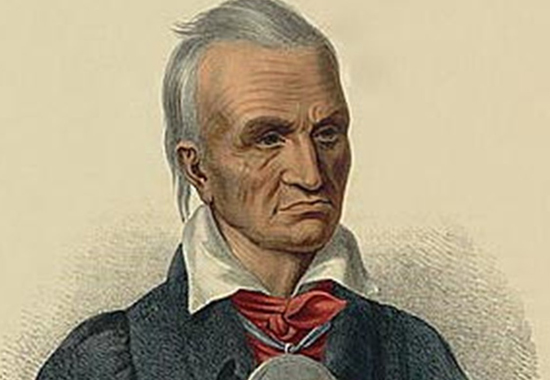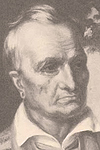|

SENECA CHIEF AND ORATORY ACE -
SAGOYEWATHA, AKA RED JACKET
We Cannot Make Land
Go here for more about
 Red Jacket.
Red Jacket.
Go here for more about
 Red Jacket's We Cannot Make Land
Speech.
Red Jacket's We Cannot Make Land
Speech.
It follows the full text transcript of
Red Jacket's We Cannot Make Land speech, delivered at
a village near Buffalo, New York - Summer of 1819.

 |
Brother, |
We understand that
you have been appointed by our great Father, the
President, to make these communications to us.
We thank the Great Spirit for this pleasant day
given us for our reply, and we beg you to
listen.
Brother, previous to your arrival at this
council fire, we were told that our great Father
had appointed a commissioner to meet us. You
have produced your commission, and it has been
read and explained to us.
You have also
explained the object of your mission, and the
wishes of the President in sending you to the
council fire of the Six Nations. We do not doubt
that the sealed document you produced, contained
the words of the President, our great Father.
When first
informed of your appointment, we supposed that
you were coming to meet us on a very different
subject. Since the war of the Revolution, we
have held various councils with our white
brothers, and in this same manner. We have made
various speeches, and entered into several
treaties, and these things are well known to our
great Father; they are lodged with him. We, too,
perfectly understand them all. The same
interpreters were then present as now.
In consequence of
what took place during the late war, we made it
known to our great Father, through our
interpreter, that we wished to have a talk. Our
application was not complied with. We sent a
messenger to brighten the chain of
friendship with our great Father, but he would
not meet around the council
fire, and we were disappointed.
We had supposed
that the commissioner he has now sent, came
forward to brighten the chain of friendship, to
renew former engagements. When we made a treaty
at Canandaigua with Colonel Pickering in 1794,
we were told, and thought that it was to be
permanent, and to be lasting, between us and the
United States forever.
After several
treaties had been entered into under our great
Father, General Washington, large delegations
from the Six Nations were invited to meet him.
We went and met him in Philadelphia. We kindled
a council fire. A treaty was then
made, and General Washington then declared that
it should be permanent
between the red and white brothers; that it
should be spread out on the
largest and strongest rocks, that nothing could
undermine or break; that
it should be exposed to the view of all.
Brother, we shall now see what has been done by
the United States. After this treaty had been
formed I then said that I did not doubt, but
that the United States would faithfully perform
their engagements. But I told our white brothers
at that time, that I feared eventually they
would wish to disturb those contracts.
You white brothers
have the faculty to burst the stoutest rocks. On
our part we would not have disturbed those
treaties.
Shortly after our
interview with our great Father, General
Washington, at Philadelphia, a treaty was made
at Canandaigua, by which we widened our former
engagements with our white brothers, and made
some new ones. The commissioner, Colonel
Pickering, then told us that this treaty should
be binding and should last, without alteration
for two lives. We wished to make it extend much
farther, and the Six Nations then wished to
establish a lasting chain of friendship. On our
part, we wished the treaty to last as long as
trees grow, and waters run. Our Brother told us
that he would agree to it.
Brother, I have reminded you of what had taken
place between our confederates, the Six Nations,
and our white brothers, down to the treaty of
Canandaigua. At the close of that treaty it was
agreed, it being as strong and binding, as by my
former comparisons I have explained, that if any
difficulty should occur, if any monster should
cross the chain of friendship, that we would
unite to remove those difficulties, to drive
away the monster; that we would go hand in hand
and prolong the chain. So it was agreed.
Brother, many years ago we discovered a cloud
rising that darkened the prospect of our peace
and happiness. We heard eventful things from
different quarters, from different persons, and
at different times, and foresaw that the period
was not very distant, when this threatening
cloud would burst upon us.
Brother, during the late war we intended to take
no part. Yet residing within the limits of the
United States, and with the advice of General
Porter, we agreed around our council fire, that
it was right, and we took a part.
We thought it
would help to promote our friendship with our
white brothers, to aid the arms of the United
States, and to make our present seats still
stronger. These were our reasons.
What were the
results?
We lost many of
our warriors. We spilt our blood in a cause
between you, and
a people not of our color.
Brother, these things may be new to you, but
they are not new to your government. Records of
these things are with our great Father, the
President. You have come, therefore, for a very
different purpose from the one we expected.
You come to tell
us of our situation, of our reservations, of the
opinion of the President that we must change our
old customs for new ones; that we must
concentrate in order to enjoy the fair means you
offer of civilization, and improvement in the
arts of agriculture.
Brother, at the treaty of Canandaigua, we were
promised that different kinds of mechanics,
blacksmiths, and carpenters, should be sent
among us; and farmers with their families, that
our women might learn to spin. We agreed to
receive them. We even applied for these
benefits. We were told that our children were
too young to be taught. Neither farmers or
mechanics were sent.
Brothers, we had thought that the promises made
by one President, were handed down to the next.
We do not change our chiefs as you do. Since
these treaties were made, you have had several
Presidents. We do not understand why the treaty
made by one, is not binding on the other. On our
part we expect to comply with our engagements.
Brother, you told us when the country was
surrounded by whites, and in possession of
Indians, that it was unproductive, not being
liable to taxes, nor to make roads nor
improvements, it was time to change.
As for the taxing
of Indians, this is extraordinary; and was never
heard of, since the settlement of America. The
land is ours, by the gift of the Great Spirit.
How can you tax it? We can make such roads as we
want, and did so when the land was all ours. We
are improving our condition. See these large
stocks of cattle, and those fences. We are
surrounded by the whites, from whom we can
procure cattle, and whatever is necessary for
our improvement. Now that we are confined to
narrow limits, we can easily make our roads, and
improve our lands.
Look back to the first settlement by the whites,
and then look at our present condition. Formerly
we continued to grow in numbers, and in
strength. What has become of the Indians, who
extended to the salt water?
They have been
driven back and become few, while you have been
growing numerous, and powerful. This lands is
ours, from the God of Heaven. It was given to
us. We cannot make land. Driven back and reduced
as we are, you wish to cramp us more and more.
You tell us of a pre-emptive right. Such men you
say own one reservation, and such another. But
they are all ours, ours from the top to the
bottom. If Mr. Ogden had come from heaven, with
flesh on his bones, as I we now see him, and
said that the Heavenly Father had given him a
title, we might then believe him.
Brother, you say that the President has sent us
word that it is for our interest to dispose of
our lands. You tell us that there is a good
tract of land at Allegany. This too is very
extraordinary. Our feet have covered every inch
of that reservation. A communication like this
has never been made to us, at any of our
councils. The President must have been
disordered in mind, when he offered to lead us
off by the arms, to the Allegany reservation. I
have told you of the treaty we made with the
United States. Here is the belt of wampum, that
confirmed that treaty. Here too is the
parchment. You know its contents. I will not
open it. Now
the tree of friendship is decaying; its limbs
are fast falling off. You are at fault.
Formerly we called the British brothers. Now we
call the President, our Father. Probably among
you, are persons with families of children. We
consider ourselves the children of the
President. What would be your feelings, were you
told that your children were to be cast upon a
naked rock, there to protect themselves?
The different
claims you tell us of, on our lands, I cannot
understand. We are placed here by the Great
Spirit, for purposes known to him. You have no
right to interfere. You told us that we had
large and unproductive tracts of land. We do not
view it so. Our seats, we consider small; and if
we are left here long, by the Great Spirit, we
shall stand in need of them. We shall be in want
of timber. Land after many years' use wears out;
our fields must be renewed, and new ones
improved, so that we have no more land in our
reservations than we want.
Look at the white
people around us, and back. You are not cramped
for lands. They are large. Look at that man.
[Mr. Ellicott, agent of the Holland Land
Company.] If you want to buy, apply to him. He
has lands enough to sell. We have none to part
with. You laugh, but do not think I trifle. I am
sincere. Do not think we are hasty in making up
our minds. We have had many councils, and
thought for a long time upon this subject. We
will not part with any, not with one of our
reservations.
We recollect that Mr. Ogden addressed his speech
to you, therefore I have
spoken to you. Now I will speak to Mr. Ogden.
Brother, you recollect when you first came to
this ground, that you told us you had bought the
pre-emptive right. A right to purchase given you
by the government. Remember my reply. I told
you, you had been unfortunate in buying. You
said you would not disturb us. I then told you
as long as I lived, you must not come forward to
explain that right. You have come. See me before
you. You have heard our reply to the
commissioner sent by the President. I again
repeat that, one and all, chiefs and warriors,
we are of the same mind. We will not part with
any of our reservations.
Do not make your
application anew, nor in any other shape. Let us
hear no more of it. Let us part as we met, in
friendship.

More History
|
|